QuestionHi there, our 8 weeks old Golden Retriever puppy just came home from our
breeder. I have read several books prior to getting our puppy, including
"Monks of New Skeet", and Ian Dunbar's "Before and after getting your puppy".
So far, I am doing everything per my literature and our breeder, keeping our
puppy confined in a small area with his crate, water bowl, and a pee pad. As I
understand, dogs do NOT like to sleep in their own filth. However, this is not
the case with my puppy. He prefers to sleep on the soaked pee pad, and
avoids his crate at all cost. I tried coercing him with food, toys, stuffed Kongs
tied inside the crate, he does NOT want to have anything to do with the crate.
What am I doing wrong?
AnswerI respect both the Monks and Dunbar. And have my own ways. The only thing 2 better dog trainers will agree on is that the third is wrong.
Your problem is likely not what you are doing, but the conditions the puppy lived in before you got it. The good news is that at 8 weeks, they are quick to accept and learn new things.
I would skip the pee pads. To do that means never leaving the puppy alone for more than 4-5 hours. For the next few weeks, you will need to take the puppy out in the middle of the night. Ours usually wake us up when they need to go.
At bed time or when you have to leave in the day time, place the puppy in a small crate bare except for a chew toy. Use a divider or block off a larger crate. Confining them in a small area without water is essential to restrict activity and allow them to go without relief for 4-5 hours. You must manage to give them a mid day break somehow if you are gone all day.
It is only natural that a puppy resists its crate at first. What the puppy wants more than anything else is to be others, you, anyone else in the household, and any other pets. In our modern society, even if we are home, other things distract us from the attention an uncrated puppy must have. The only real solution is to crate the dog when you aren't around. The dog may be happier in its den than loose in the house. It relaxes, it feels safe in its den. It rests, the body slows down reducing the need for water and relieving its self. Dogs that have been crated all along do very well. Many of them will rest in their crates even when the door is open. I think the plastic ones give the dog more of a safe, enclosed den feeling. Metal ones can be put in a corner or covered with something the dog can't pull in and chew. Select a crate just big enough for the full grown dog to stretch out in.
Much of housebreaking is not training the puppy, but making it easier for your puppy, you, and your carpet while its body to catches up to its instincts. At around 8 weeks when the puppy goes to its new home, the time from when it realizes it has to go, and when it can't wait any longer is a matter of seconds. Only time will fix that. You can hardly be expected to be attentive enough to avoid all accidents. There is no sense punishing the puppy for your inattention. It is not fair to punish you either, but you still have to clean it up if you didn't have the puppy outside in time.
Housebreaking starts before you get home with the new puppy. If you don't have a crate, buy one. I prefer the more enclosed, den like plastic ones. Skip the bedding. At first it gets wet, and later it can be chewed into choking hazards. A wire grid in the bottom will help keep the puppy up out of accidents at first. They are available with the crates, but expensive and hard to find. A piece of closely spaced wire closet shelving from a home supply place is cheaper. I am now using a plastic vegetable bin with plenty of holes drilled in the bottom. It helps block off part of the crate for the smaller puppy. If you already have a metal crate, covering it may help. Just make sure you use something the puppy can't pull in and chew. Dogs that start out in crates as little puppies, accept them very well. Never leave an unattended puppy loose in the house. If nobody can watch it, put it in the crate. I suggest letting the dog have its crate all its life. A crate needs to be just big enough for a dog to stretch out in.
Choose a command and spot you want it to use. The less accessible to strays, the less chance of serious disease. If it is a female, choosing a non grassy spot will avoid brown spots later. When you bring it home, take it to the spot and give it the command in a firm, but friendly voice. Keep repeating the command and let the puppy sniff around. Sometimes you need to walk it around to stimulate its body to eliminate. If it does anything, praise it. Really let it know what a good dog it is and how much you love it, and maybe a treat. Note, being out there not only means you can praise it, but it also keeps it from being snatched by a hawk. If it doesn't go, take it inside and give it a drink and any meals scheduled. A young puppy will need to go out immediately afterward. Go to the spot and follow the above routine. Praising it if it goes is extremely important. If it doesn't go, walk it around. They can only walk and hold it so long. If still nothing, take it back inside and put it in its crate and try again soon. Do not let it loose in the house until it does go.
At first it is your responsibility to know and take the puppy out when it needs to go. It needs to go out the first thing in the morning, after eating, drinking, and sleeping. If it quits playing, and starts running around sniffing, it is looking for a place to go. Take it out quickly. You will just have to be what I call puppy broke until it is a little older. How successful you are depends on how attentive you are.
By the time most dogs are about 3 months old, they have figured out that if they go to the door and stand, you will let them out. The praise slowly shifts to going to the door. Some people hang a bell there for the dog to paw. If your dog doesn't figure this out, try praising it and taking it out if it even gets near the door. When you catch it in the act, give it a sharp ''Ah, ah, ah!'' and take it out. Clean up accidents promptly. I mostly keep the little puppies out of the carpeted rooms. Still I need the can of carpet foam sometimes. First blot up all the urine you can with a dry towel. Keep moving it and stepping on it until a fresh area stays dry. A couple big putty knives work well on bowel movements. Just slide one under it while holding it with the other. This gets it up with a minimum of pushing it down into the carpet. This works with even relatively soft ones, vomit, dirt from over turned house plants, or anything else from solids to thick liquids. Finish up with a good shot of carpet foam. Note, do not let the puppy lick up the carpet foam. Once the dog is reliably housebroken, your carpet may need a good steam cleaning.
Many people strongly strongly push cleaning up all evidence of past accidents. I am slower to suggest that. Dogs will return to the same spot if they can find it. When you see one sniffing the spot, that is your clue to run it out.

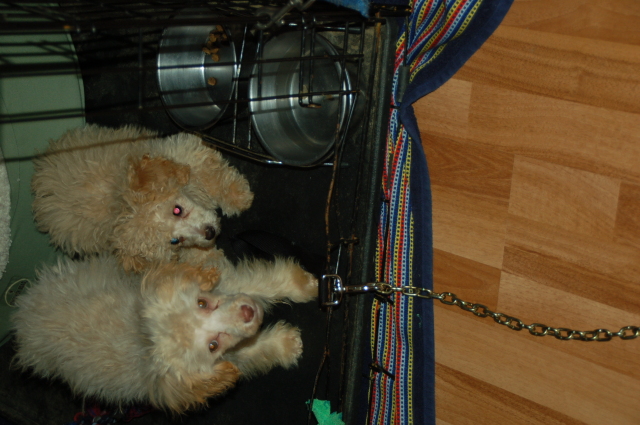 puppy behavior
Question
Cooper and Guy
Hi, thanks so much for reading
puppy behavior
Question
Cooper and Guy
Hi, thanks so much for reading
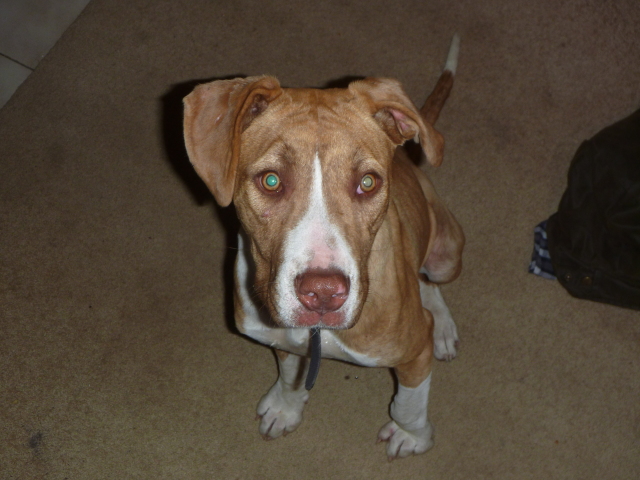 Malnurished Bull Mastif x Great Dane ;
Question
Sticks
Hi,
Ive recently, (the last 24 hours) b
Malnurished Bull Mastif x Great Dane ;
Question
Sticks
Hi,
Ive recently, (the last 24 hours) b
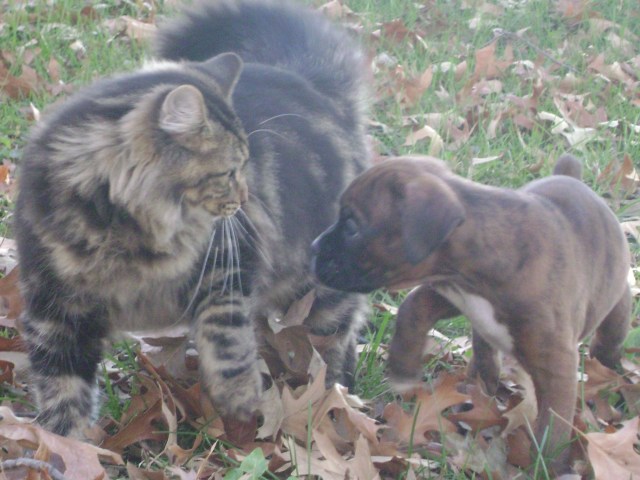 Puppy wont come
Question
Capone & Rascal
Help! My seven week
Puppy wont come
Question
Capone & Rascal
Help! My seven week
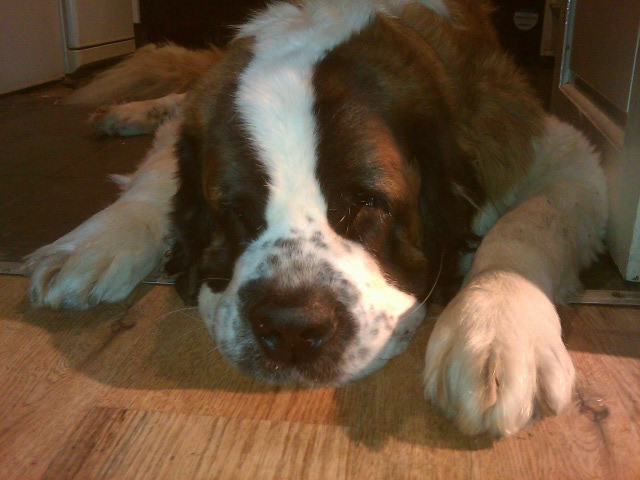 st bernard archy.
QuestionQUESTION: I have a four year old st bernard. I
st bernard archy.
QuestionQUESTION: I have a four year old st bernard. I
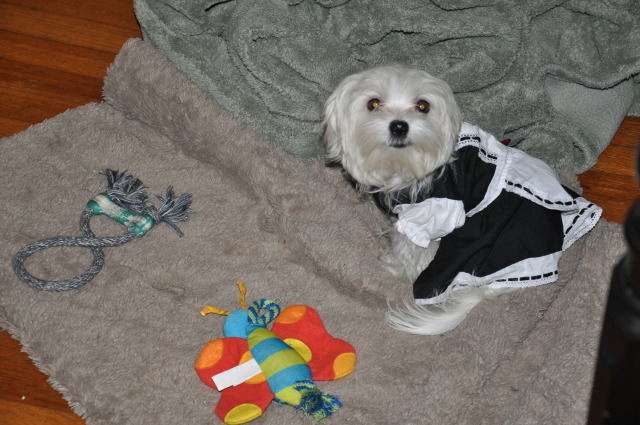 Potty problems
Question
QUESTION: Hii Okay i have a 6 month old
Potty problems
Question
QUESTION: Hii Okay i have a 6 month old